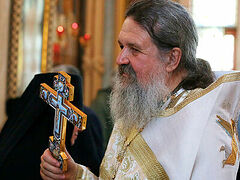On October 21, 2016, the Holy Synod of the Russian Orthodox Church canonized St. Arsenia of Ust-Medvedits as a locally venerated saint of the Volgograd Metropolis.
Abbess Arsenia (1833-1905) came from a notable family of the Don region. At the age of seventeen, Anna Mikhailova entered the Ust-Medvedits Monastery of her own accord. The monastery reached its highest peak in the forty years of her abbacy, from 1864 until her repose on August 3, 1905.
Besides her educational and charitable activities, the main fruits of Venerable Arsenia’s labors were the Kazan Cathedral, which was erected from 1785 to 1885, and the famous caves, dug in the image of the Kiev Caves. Today the monastery’s main shrine is there—the miraculous stone slab with hand and knee imprints of people kneeling in prayer, where the faithful come to beseech St. Arsenia for healings, the good arrangement of worldly affairs, and prosperous family lives.
In addition to her holy life, St. Arsenia left us valuable writings on the spiritual life, which we present in honor of the anniversary of her canonization.
Without God, without His help and grace, man can’t even approach the concept of spiritual goodness. What can man do? Only one thing: bow down to the will of God and in humility of spirit call out to Him: “Lead me, O Lord, wherever You will, and help me to fulfill Your will.” And how easy, how salvific it is to follow the path where the Lord leads.
Does it please the Lord to fulfill our request and give peace and calm to our lives? If we don’t dare persistently ask for something from someone else, even more so must we not ask it of God and expect that our request will certainly be fulfilled. We don’t even know what’s good or what’s bad for us. But we can see God’s help, His mercy for us in that He allows us to bear the unbearable with patience, with humility, with submission to His holy will.
Without the Lord, we can’t take anything; without Him we can’t give anything. He gives us everything by His grace. Those who loved Him saw Him everywhere and in everything, and He revealed to them His living word, revealed His will and the ways of His providence. How and in what is it revealed? In the purity of their hearts. We must, with God’s help, preserve our hearts from the passions. Preserve it first of all from doubt, from pride; preserve it from lying, from self-justification; preserve it from antipathy, from contempt for one’s neighbor. And if, with the grace of God helping us, we keep all these passions from possessing our heart, then it will be able to accept the prompting of the word of God and follow His will.
With any discomfiture and temptation, the only consolation and way out is humility. This is the only path that leads the soul to the truth that clarifies everything, to the warmth that heals, to the freedom that relieves. If you lose this path of humility, then the soul is surrounded by darkness and is constricted and pressed. This leads to false reasoning, which is disastrous, because false reason puts everything in the wrong light: All circumstances seem bitter and disastrous; you can’t see the ways of God in them, the great judgments of His saving providence; people become not brothers, but enemies, and their infirmities grow to the farthest extremes.
Our own infirmities become terrible and even living images of internal torments. Yes, there is only one saving path then—that of humility.
Where there is passion, there is constriction and suffering. That passions live in our hearts is indisputable, but they don’t make themselves known by that unbearable weight when we’re not aware of them and simply fulfill them. They don’t languish even when we become aware of them and resist them. But when we become aware of them within ourselves and don’t want to rebel against them with all the strength of our soul, when we reject them with one part of our soul and listen to their sweet speech with another, when we turn away from reproaches, when we feel sorry for ourselves and aren’t bold enough to follow our Cross-bearing Teacher on the way of the Cross, then, of course, we will feel anguish and pain. The Lord, Who has taken all our sins and infirmities upon Himself, showed an example of the struggle of the will. In the Garden of Gethsemane, He was tormented until His will agreed to accept suffering.1 Try your heart, and you’ll see that there are many conflicts within it. We must once and for all give our souls over to the guidance of the will of God, to following His commandments, and to the guidance of the harsh monastic rules. When the soul agrees, then it will be easy.
The Lord saves us by all means; these grave bodily ailments that so often visit us constantly remind us of death. And what can be more beneficial for the soul than the remembrance of death? It frees us from all earthly predilections, it allows us to know the value of all earthly affairs, and most of all, it helps us strive for the future life. May God grant that your illnesses bring fruit to your soul: salvation. We believe that everything that the Lord builds serves for our benefit and our eternal salvation.
Instead of our desires, there should be the commandment of God, the will of God leading us to eternal life. If you were at war, could you say you don’t want to go fight? No, you would go, without thinking about it, to certain death. If there’s a spiritual battle ahead, if God’s commandments demand a struggle, how can we say we don’t want to fight, that it would be better to give ourselves over as captive to our enemies? What a disgrace! What horror someone who slackens his will to such a point will experience in this life; and in the future life, his soul will endure even greater shame when all of its deeds and thoughts are revealed! You have to entreat, to pray to the Lord to strengthen your will to resist passionate thoughts, to turn all the powers, all the aspirations and desires of the soul to higher goals—holy, high,and noble. Every indulgence in one’s passions kills the purity of moral feeling. The conscience, that natural moral law written in our hearts, goes deaf if we don’t listen to it and act contrary to its promptings. What are these words: “Do I want to or not?” These words have no meaning where the moral law of the salvation of the soul is concerned.
We are all judged by the word of God, given to us for guidance in life, for salvation, for showing the path to eternal life, for our purification. It judges us when we don’t listen to it, when we transgress it. It will also judge us in the future life. It’s fearful to sin before it. It’s fearful because the heart becomes callous, and the word of God ceases to act upon it. This condition is worse than bodily death. Don’t jest with your feelings; they, like a fire, can destroy everything in the soul, the heart, and the mind: What the word of God has planted, they will burn, leaving the soul with only its passions and sins. We have to preserve purity of body and soul, otherwise the soul will die an eternal death, and this death is more terrible than anything that exists in the heavens or on earth. Look in the lives of the saints, how good people struggled and sought the Lord with all the strength of their soul and body.
The Lord Jesus Christ took human nature upon Himself in order to cleanse it from original sin, and died a shameful death on the Cross to put sin to death. By His Resurrection and the Ascension of our nature into Heaven, He gave us the power to be sons of God. In Baptism, we receive a pledge of this sonship; and if we want, we can receive all the gifts of His grace; by Baptism we entered through the door opened to us by the Lord Himself. If we follow the path of His commandments, if we follow His word and the example of His life, if we partake of His goodness and truth, then original sin will not operate within us, but rather the grace of Christ. We have to acquire faith in the Redeemer, to believe that it’s only by His righteousness that we can be saved from our unrighteousness. By His sanctity we are sanctified, by His purity our filth is cleansed. Without the Lord Jesus Christ, all of mankind perished in sin; without the Lord, every soul would perish in its sin. Because we follow sin and the will of our flesh, it takes root in us, reigns over our soul, over our mind and our hearts; it stands like a wall between the soul and the Lord. Therefore, it’s necessary to call on Him in prayer so He might come to the soul and destroy this partition.
The passions sometimes persist and act imperiously in our heart, regardless of our will, even as if against our will. The Lord allows them to torment us this way so that we might fully realize our powerlessness, that we might be humbled in spirit, that we might seek strength in our one mighty and holy God.
Man lives an earthly life: Everything in it is mortal, everything is transitory. Circumstances change, human feelings change, they pass away. If someone lives only in circumstances and feelings, then he constantly tastes death, everything in his life dies, and he himself is under condemnation of this death. When a man in this transient, mutable life seeks the Lord, when every circumstance of life teaches him to know the Lord, every feeling directed according to the commandment of God draws him closer to contemplating the Lord, imprinted in a pure heart. When the Lord resurrects in the human soul, then the condemnation of death is destroyed, because mortal circumstances, mortal feelings, led a man to an immortal state and tasting them didn’t bring death, but rather life. When a man lives only by mortal things, the evil one uses all earthly circumstances and feelings to set his traps. If this mortality has turned into immortality for a man, if it led a man to knowledge of the Lord in the circumstances of earthly life, to union with Him in the spirit through earthly feelings, then the enemy’s nets are broken, and the Lord, acquired through mortal life, has become deliverance from the destruction that the enemy was preparing through his nets, having concealed a deadly poison in them. All this is in the spirit, all this is experienced by the soul—and within itself, in its life, it sees the explanation of the word of God.
Our path is the path of sinners, which we truly are. We have to be humbled and not deviate from this path of repentance; not take on the guise of a righteous man when we’re sinners, and not look for ways to justify ourselves, but wait and believe that our justification is Christ.
The Lord commands us to settle accounts with our adversary while we’re yet on the way with him. While we’re still on the path of life, we can settle these accounts, settle them by renouncing what hinders us on the path of spiritual ascent, by renouncing everything that accompanies us in this life. When our path ends, there will be no objects or feelings to renounce; there will be only spiritual poverty and the wealth of spiritual torment, like a debtor who hasn’t managed to pay back his debt. A debtor doesn’t always suffer just from the fact that his conscience upbraids him, but more so because he is deprived of what he imagined himself to have; he is deprived of all his possessions, contentment, and freedom. Yes, we have to pay our debt to our adversary while we’re on the way with him—by renunciation.







